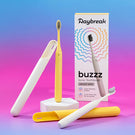Getting dentures for the first time can be a confusing and anxiety-inducing experience. It can be difficult to navigate all the information available to guide you through this new phase. Whether you're considering dentures for yourself or for a loved one, you likely have some questions and concerns. In this blog post, we'll cover everything you need to know about dentures, including what they are, how they work, and how to care for them.
What are dentures?
Before we dive deep, let’s just run through the basics in case you’re completely new to this and have no idea what you’re in for. So, what are dentures?
Dentures are artificial teeth and gums designed to replace missing natural teeth. They come in two main types: complete dentures and partial dentures.
Complete dentures are used to replace all of the teeth in the upper or lower jaw. They are often custom-made to fit the individual's mouth and can be either
- conventional or
- immediate.
Conventional dentures are made after the remaining teeth are removed and the gum tissue has healed, whereas immediate dentures are made in advance and can be worn immediately after the teeth are removed.
Partial dentures, on the other hand, are used to replace one or a few missing teeth. They consist of a metal or plastic framework with one or more artificial teeth attached to it. Partial dentures can be either removable or fixed (also known as bridges), and can help prevent the remaining natural teeth from shifting out of position.
How do dentures work?
Dentures are designed to fit snugly over the gums and remaining bone in the mouth. They are typically held in place with suction or dental adhesive. Dentures may take some time to get used to, as the individual will need to adjust to the feeling of having a foreign object in their mouth, and may need to relearn how to speak and eat.
It's also important to note that dentures may require periodic adjustments or replacements over time, as the gums and bone continue to change shape and size.
What are dentures made out of?
Most types of dentures are made of porcelain or acrylic resin. Porcelain dentures are made of a material that is ceramic glass-like. They can be made to match the patient’s natural teeth and they last longer. But they are more fragile compared to acrylic resin.
Acrylic resin presents a cheaper, lightweight option. These types of dentures cost less and are relatively popular. They are comfortable to wear but the downside is that they wear out faster and would require regular replacement.
Dentures typically take a few weeks to be made. A dental professional will likely ask you to come in to create your dental impressions. A model is then made with your dental impressions and then your actual dentures are crafted with this model. Adjustments are made if required and your dentures are finally ready!
How do I care for my dentures?
Proper denture care is essential for maintaining oral health and the longevity of the dentures. Here are some tips for caring for your dentures:
- Remove your dentures and rinse them with water after eating to remove any food particles.
- Brush your dentures with a soft-bristled brush and denture cleaner to remove any plaque or bacteria.
- Soak your dentures overnight in a denture cleaning solution, following the manufacturer's instructions.
- Brush your gums, tongue, and any remaining natural teeth with a soft-bristled brush twice a day to maintain oral hygiene.
- Avoid using hot water or harsh chemicals on your dentures, as this can damage them.
- Do not sleep with your dentures in, as this can cause irritation and infection.
- See your dentist regularly for checkups and adjustments to your dentures.
Why and to whom are dentures prescribed?
The typical symptoms of patients who are prescribed dentures by the dentist include:
- Missing teeth: The primary indication for dentures is missing teeth. Individuals who have lost most or all of their teeth due to decay, gum disease or any other reason, may be in need of dentures.
- Difficulty chewing: Patients who have missing teeth might experience difficulty in chewing their food properly. This can often affect their overall health and nutrition.
- TMJ disorders: Misaligned or missing teeth can cause Temporomandibular joint (TMJ) disorders, which can result in jaw pain and headaches.
- Speech issues: Missing teeth or ill-fitting dentures can lead to speech difficulties such as slurring, mumbling or lisping.
- Self-consciousness: Many people feel self-conscious about missing teeth, which can affect their confidence and overall quality of life.
If you are experiencing any of these symptoms, it is important to visit your dentist to discuss your options for dental treatment, including the possibility of dentures. A dentist can examine your mouth and provide a treatment plan based on your individual needs.
FAQs about dentures
There are several common concerns that people have about dentures. Here are some of the most frequently asked questions:
Q. Will dentures affect my ability to eat and speak?
A: Dentures may take some time to get used to, but with practice, most people are able to eat and speak comfortably with dentures.
Q: Will my dentures look natural?
A: Modern dentures are designed to look and feel like natural teeth, so most people won't even be able to tell that you're wearing dentures.
Q: How long do dentures last?
A: Dentures typically last between 5-10 years, but may need to be adjusted or replaced sooner depending on wear and tear, changes in the mouth, and other factors.
We hope this information has been helpful. There are many factors that can contribute to the loss of teeth that could make dentures necessary. And while getting dentures can certainly result in a massive improvement in the quality of life for those in need, we believe prevention of oral health issues is always better than the cure. Using the right daily oral care essentials would help eliminate a whole lot of those factors which include gum infection.
For more information, you may contact your dentist to aid you with whatever questions or concerns you may have with your dentures.
Read More:
Interdental Cleaning and the Link Between Oral and Systemic Health
All You Need to Know About Oral Cancer







